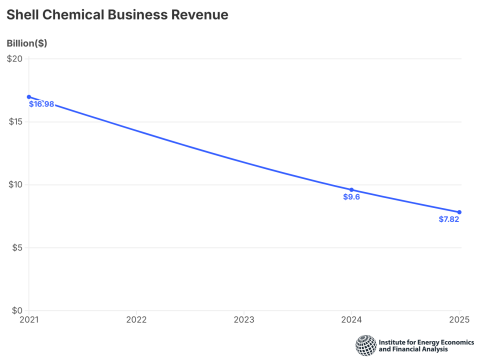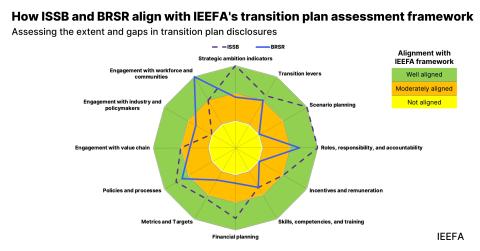The case for divesting coal from the Norwegian Government Pension Fund Global
Download Full Report

Key Findings
The GPFG’s coal-mining holdings remain substantial, most notably its holdings in China’s Shenua, a company that produces 400 million tons per year.
In April 2015, the government released a white paper reviewing the management of the GPFG. The white paper included a summary of the Expert Group’s findings regarding investment decisions in coal, and largely concurred with them.
The policy debate about whether the GPFG should divest further from the coal sector is taking place during a period in which the global coal industry is shrinking. The market for coal, particularly thermal coal, is in a state of decline.
Executive Summary
Over the past two years, Norges Bank, following upon its investment mandates from the Norwegian Parliament (Stortinget) and the Minister of Finance, divested the Norwegian Government Pension Fund Global (GPFG)’s of its holdings in at least 49 companies with substantial operations related to mining and burning of coal.
The decision was based on the conclusion that the business models of these companies were unsustainable for environmental reasons and because of the financial risk in its exposure to coal. Despite this reduction GPFG retains substantial holdings in coal mining companies. The Fund also has significant holdings in utilities and power-generation companies, many of which have coal plants in their generation mix.
The question before the Stortinget now is whether to consider a more thorough divestment from coal mining and coal-burning power generation companies. This paper notes that substantial losses have already accrued from such holdings and that the constellation of financial, environmental and climate risks in such holdings makes a full divestment from these stocks practical and prudent. The coal industry globally is in a state of structural decline. It is a shrinking industry with little upside potential. Coal stock prices have collapsed, markets are oversupplied and some analysts—including this one—have concluded that coal markets will never recover. Normal cyclical recoveries that have seen coal stocks and coal demand rebound in the past are most likely a thing of the past. Coal faces new market competition, new concerns over climate and air pollution leading to more restrictive policies, and new waves of public opposition. These factors are leading to permanent declines in market share in many area of the world and a general slowdown in the rate of coal mining and burning even in countries that rely heavily on coal. Coal prices have dramatically declined for the last four years straight, and are expected to remain at prices that are unsustainable from the companies’ point of view through 2021.
Investors have already lost billions of dollars in shareholder value in the coal sector. The Stowe Coal Index, an index of leading global coal stocks, has lost 71% of its value over the past five years. The Standard and Poor’s 500 Index rose during the same period by 76%. In the U.S., where the decline in coal use has been the most acute coal-mining companies have lost between 60% and 90% of their stock value.
Leading utilities around the world that depend heavily on coal also have lost share value. Five of the seven largest utility holdings in the GPFG portfolio with concentrations of coal-fired power in excess of 20% are experiencing significant share-value deterioration. In the U.S., coaldependent utilities have shed billions in coal related assets. Despite plans in both India and China, two of the world’s leading coal consumers, to continue burning significant quantities of coal, each country is fast shifting gears to invest significant capital in renewable energy. Air pollution in both countries has stretched the patience of the public and constitutes an imminent political threat to the legitimacy of ruling parties.
The use of coal will continue around the world for the foreseeable future, but public opposition to coal mining and coal burning is also occurring in almost every major country where coal is burned and where mining is taking place.
GPFG places a high value on its engagement with companies in its portfolio. GPFG is involved with hundreds of companies annually at the staff and board level. The engagement process has been used to good effect. It is GPFG’s preferred option over divestment in most cases. The engagement process implies shared concerns between shareholders and management. The issue of climate change has been a matter of growing concern for over a decade. The coal industry leads global opposition to both environmental and climate change initiatives, a position that has shown disastrous results for investors.
A process of further engagement will be futile. A call for a broader mandate to divest from companies involved in coal mining and coal burning has the advantage of being clear, effective and achievable.
On the mining side, the evidence of a broad, long-term structural decline that is destructive to share value is beyond dispute. The coal industry is arguably the poorest-performing sector in today’s global economy. The only point of debate for the foreseeable future for coal mining is how much worse it will get.
For coal-burning utilities, it is a matter of risk exposure. Companies with large concentrations of coal in their portfolio have proven quite vulnerable. Even those supported by national governments and regulators are likely to see reductions in coal use. Many large utilities are already shifting away from coal. Those wedded to long-term, heavy dependence on coal are unlikely to succeed.
We suggest that the Fund extend its divestment rationale to companies with more than 20% of their production in coal (or that mine more than 50 million tons of coal per year). The Fund should divest also from utilities and power-generation companies that get more than 20% of their generation capacity mix from coal-fired power plants.
The high level of risk outlined in this paper for both coal-mining and coal-burning companies suggests weak long-term performance and is best avoided altogether.
Press release: Case for Divesting Coal from the Norwegian Government Pension Fund Global
Please view full report PDF for references and sources.















